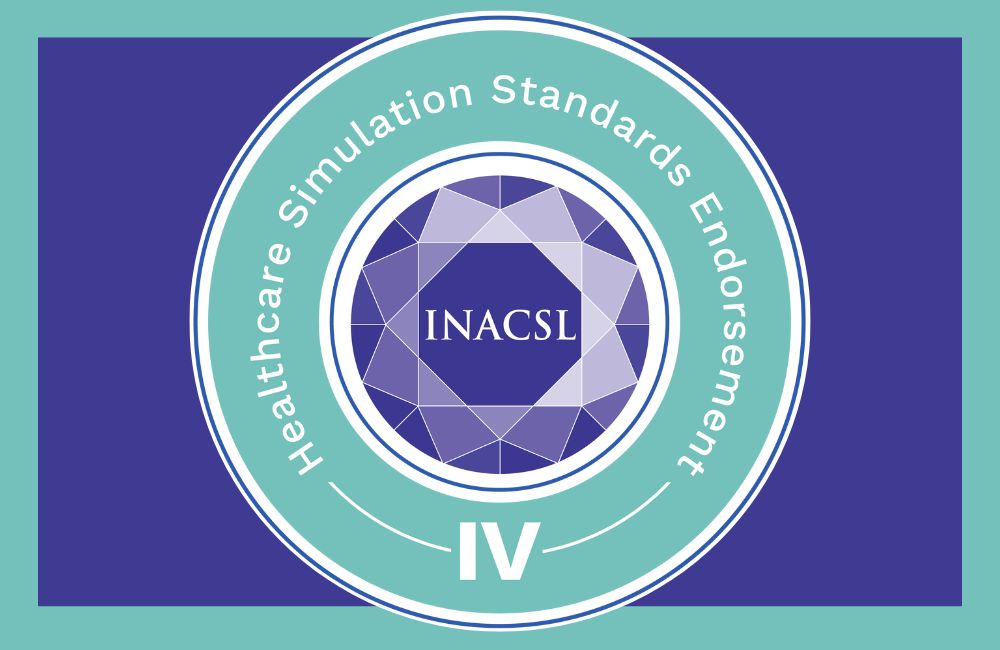The International Nursing Association for Clinical Simulation and Learning (INACSL) recently established a Healthcare Simulation Standards Endorsement to recognize healthcare institutions and practices that have demonstrated excellence in applying all four clinical simulation standards from the Healthcare Simulation Standards of Best Practice (HSSOBP) in their educational simulation programs. The four standards include Prebriefing: Preparation and Briefing, Facilitation, Professional Integrity, and Debriefing. This HealthySimulation.com article explains the purpose of the healthcare simulation endorsement and shares the intended goals and benefits of this program – of which a pilot was successfully completed in June 2022.
Ultimately, to receive this endorsement, organizations must demonstrate a commitment to pursuing and sustaining excellence in the four standards mentioned above, designated as the “Core Four” Health Simulation Standards. According to INACSL, these Healthcare Simulation Standards are meant to guide the “integration, use, and advancement of simulation-based experiences within academia, clinical practice, and research.”
The organization adds that the recognition of such Healthcare Simulation Standards is aspirational. Further, context, resources, accreditation needs, and other factors may affect the implementation and attainment of the Healthcare Simulation Standards.
In publicly recognizing institutions that excel in creating simulation experiences that enhance learning, promote professional development, and/or advance the science of simulation, INACSL hopes to use the endorsement to facilitate the sustained application of best practices to clinical simulation experiences and programs. Another goal of the endorsement is to recognize all varieties of simulation-based experiences, including skills training, low-fidelity to high-fidelity, Augmented Reality (AR)/Virtual Reality (VR), distance, manikin-based, and various types of technology.
The endorsement opportunity is meant to create positive changes that improve healthcare simulation based on the application of evidence-based practices and research. The organization also aims to use the endorsement to promote ongoing performance evaluation and improvements within simulation programs and improve healthcare education and patient safety through the promotion and practice of high-quality simulation.
Designation period and renewal details: Accepted institutions receive the endorsement for three (3) years, at which point, they may reapply for the endorsement for an additional period of five (5) years. Institutions that have partially met the criteria may receive a conditional endorsement and will be given one (1) year to resubmit along with a filing fee of $250 and be reevaluated for receiving the official endorsement.
Examples of Simulation Programs Awarded the INACSL Endorsement
UCF’s College of Nursing: The international endorsement has recognized the STIM Center for demonstrating excellence in applying the Core Four Healthcare Simulation Standards of Best Practice, which are Prebriefing: Preparation & Briefing, Facilitation, Debriefing, and Professional Integrity. The STIM Center was also recognized for the facility’s commitment to innovation in the field, as the STIM Center regularly incorporates new technologies, such as augmented, virtual and mixed reality, into healthcare simulation learning experiences.
Villanova University FCN SLRC: The Simulation and Learning Resource Center (SLRC) of the Villanova University M. Louise Fitzpatrick College of Nursing (FCN) was also among the first healthcare simulation centers to be endorsed by the International Nursing Association of Clinical and Simulation Learning (INACSL) in their new Healthcare Simulation Standards Endorsement program. According to Donna S. Havens, Ph.D., RN, FAAN, Connelly Endowed Dean and Professor, the university’s evidence-based simulation environment has been carefully designed for our nurses and advanced practice nurses to be the best for patients and communities.
The University of Oklahoma Fran and Earl Ziegler College of Nursing: The Fran and Earl Ziegler College of Nursing at the University of Oklahoma recently received The Healthcare Simulation Standard Endorsement Award by the International Nursing Association of Clinical and Simulations Learning as well. Julie Fomenko, Ph.D., MSN, RN, CHSE explained that the recognition of the nursing simulation program demonstrates the college’s high standards for simulation education at the college, the expertise of our simulation faculty and staff across all five College of Nursing sites, and their dedication to innovation and advancement of the science of nursing simulation.
INACSL 2022 Sim Media Center HealthySimulation.com Interview on the INACSL Endorsement Program
HealthySimulation.com: Can you explain a little more about what the INACSL endorsement program is?
Teresa Gore, Ph.D., DNP, APRN, FNP-BC, CHSE-A, FSSH, FAAN (Endorsement Program Chair at INACSL): In a lot of programs, you have people who’ve gone through the certification and that’s one of the things we’re looking for. We really do want to look at the people being certified because that shows that they have that knowledge. That knowledge now we’re looking at them applying it. That is where the endorsement program comes in and it’s more than one person. You can’t endorse a program if there’s only one person doing it.
HealthySimulation.com: Can you tell us a little bit more about accreditation?
Tom LeMaster RN, MSN, MEd, NREMT-P (Program Director for the Center for Simulation and Research at the Cincinnati Children’s Hospital): Accreditation really looks a lot at outcomes. What happens? What are the outcomes of your overall program in the core standards? When there are core standards mentioned, the core standard accreditation is more encompassing where they’re looking at your mission, your vision, your leadership, your financial back, and your SOPs, a deep and deep dive is taken into all of those things. It could take years to do this process, start to finish.
More About INACSL
INACSL’s mission is to advance the science of nursing simulation by providing worldwide professional development, networking resources, and leadership in defining healthcare simulation standards of best practice. Formally naming itself INACSL or the International Nursing Association for Clinical Simulation and Learning in 2002, the organization has grown from an all-volunteer organization based in Texas to a worldwide resource with over 2500 members. INACSL educational materials and resources can be used by anyone.
INACSL holds an annual four-day conference every June in various centers around the United States and Canada. The conference focus is mostly geared toward Nursing Education at the undergraduate and graduate levels. Hospital education departments could also benefit from conference attendance. These events provide education sessions, research results, networking opportunities, and vendor exhibits for leading companies such as Laerdal, CAE Healthcare, SimulationIQ, Gaumard, B-Line Medical, KBPort, Pocket Nurse, 3D Systems, and more. In addition, INACSL provides webinars, leadership book clubs, and journal roundtables in a virtual format.
INACSL is accredited as a provider of continuing nursing education by the American Nurses Credentialing Center’s Commission on Accreditation. In addition to the standards of best practice, INACSL offers other online resources including homegrown solutions links, a bibliography of simulation articles, and resources for researchers. INACSL publishes the journal Clinical Simulation in Nursing with Dr. Nicole Harder as the current Editor-in-Chief.









